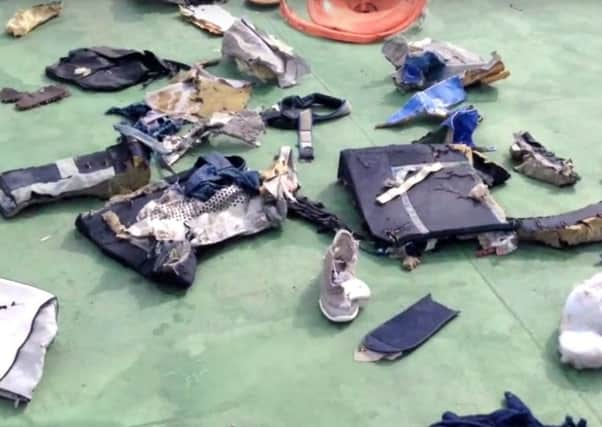Forensic chief denies EgyptAir plane brought down by explosion


“Everything published about this matter is completely false,” Forensic Medicine Authority head Hisham Abdul Hamid said.
Earlier, a forensic official was quoted as saying the remains were so small a blast was the only logical explanation.
Advertisement
Hide AdAdvertisement
Hide AdAll 66 people on board Flight MS804 were killed when the plane crashed into the Mediterranean Sea last Thursday.
The Airbus A320 was flying overnight from Paris to Cairo when it vanished from Greek and Egyptian radar screens, apparently without having sent a distress call.
Debris from the plane has been recovered from the sea, some 290km (180 miles) north of the Egyptian port city of Alexandria.
Yesterday, an unnamed senior Egyptian forensic official - described as part of the Egyptian team investigating the crash - was reported as saying: “The logical explanation is that an explosion brought it down.”
The official said he had personally examined the human remains that had so far been brought to a mortuary in the capital, Cairo, and described them all as “small”.
“There isn’t even a whole body part, like an arm or a head,” the official said. “But I cannot say what caused the blast.”
The same official was later quoted as saying at least one piece of an arm had signs of burns, an indication that it might have “belonged to a passenger sitting next to the explosion”.
But after his comments were published the official Mena news agency quoted a statement by Mr Abdul Hamid denying the Forensic Medicine Authority had already concluded there was an explosion.
Advertisement
Hide AdAdvertisement
Hide AdAn independent aviation safety expert was also quoted as saying the condition of the remains could be the result of several scenarios.
Egypt’s president has said that “all scenarios are possible” and the search continues for the plane’s flight data and voice recorders, known as the black boxes.
However, Egypt’s minister of civil aviation said on Friday that a terrorist attack was more likely than a technical failure.
There are also conflicting reports over whether or not the Airbus A320 swerved before it plunged into the sea. Egyptian radar equipment did not register any abnormal movement by the aircraft, but tracked the plane for only a moment before it disappeared.
Greece’s defence minister had already said thatbefore it disappeared from Greek radar, the plane abruptly turned 90 degrees left and then 360 degrees to the right, dropping from 37,000ft to 15,000ft and then 10,000ft.
The Aviation Herald also reported that the plane sent a series of warnings indicating that smoke had been detected on board three minutes before it disappeared.
The warnings do not indicate what might have caused the smoke.
In a search for clues, family members of the victims arrived at the Cairo morgue forensics’ department yesterday to give DNA samples to help identify the remains of their kin.
Egypt has dispatched a submarine to search for the flight’s black boxes. Ships and planes from Britain, Cyprus, France, Greece and the United States are also taking part in the search.